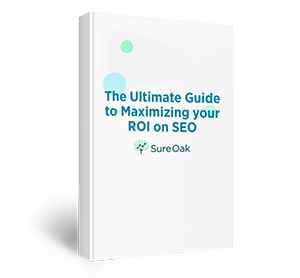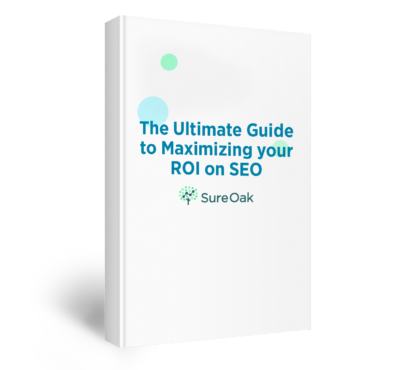Getting your fintech company to the top of Google search results can boost your company’s bottom line. As a result, link building for fintech should be on the radar for any brand looking to expand its reach.
In this guide, we’ll cover the 10 best ways to expand your fintech company’s backlink profile. Alongside our fintech link strategies, we’ll discuss why you need a link building strategy for your fintech company. We’ll also pull out some numbers from a real-life case study to illustrate how effective link building can be when driving organic website traffic.
Why is Link Building Crucial for Fintech Companies?
Link building strategies are a vital component of off-page fintech SEO. Optimizing your website for Google’s search engine results page, more commonly known as SERP, gives your website a chance at ranking above your competitors.

That’s important because the lion’s share of web traffic goes to the first few ranking websites on Google’s SERP. In fact, the top three search results capture 75% of all internet-based sales. The remaining quarter essentially goes to other websites on the first page of Google. As a result, only some internet searchers ever venture onto the second page of Google’s search results or beyond.
Google uses proxy indicators like the number of hyperlinks that connect back to your website to help determine how high you should rank on its SERP. However, not all backlinks are made equal. A large number of external links from low authority or “spammy” websites can negatively impact your website’s performance. That’s why it’s important to cultivate organic backlinks from authoritative websites within your niche.
10 Outreach Strategies to Take Your Fintech Company to the Next Level
Apply the following best practices to your fintech link building outreach strategy to elevate your website to the top of Google.
1. Use Original and Compelling Data and Statistics
One of the best ways to stand out from the competition is to publish original research. This could be something as simple as a consumer survey. While there’s no guarantee that your survey will go viral or even draw significant attention, it does stand a better chance of getting eyeballs on your website than simply reusing third-party data.
Reciprocation is a theme that will pop up repeatedly on our list. When it comes to building an online reputation, it’s best to start by providing some form of value. To that end, ensure that your original data or statistics offer actionable insight into your field.
2. Reach Out to Influencers in the Financial Tech Industry
Influencer marketing has gotten a bad rap in recent years. While the term might bring to mind Instagram-obsessed millennials in designer clothing, the reality is that influencers exist in virtually every field, including the financial technology sector. Spending on influence marketing continues to experience high year-over-year growth, and for a good reason. Only 38% of consumers trust brand-produced content compared to 61% who trust influencer-produced content.
3. Find Relevant Fintech Sites and Write for Them
Guest posting is one of the oldest and still highly effective strategies. Writing an article for a reputable fintech website like Bloomberg or Forbes can significantly boost your brand and website. That’s because off-site SEO thrives on backlinks from reputable organizations. Before you start, it’s a good idea to draw up a shortlist of websites in the fintech space that accept unsolicited submissions. Not all websites will, and those that do often have strict publication guidelines and stiff competition.
Stand out by crafting an original pitch that delivers value to the consumer. Discussing the problem that your product or service solves is a great place to start. While your guest post can mention your company, it should not read like an advert. Successful guest posts toe the line between informative and promotional, and a professional guest post service can help ensure that your content maintains this balance effectively.
4. Use Social Media
Amassing a following on a significant social media platform like Facebook, LinkedIn, Instagram, or Twitter is a fantastic way to build search visibility. However, as in most of our other tips, it is to provide value to the end user. This could be posting informative, helpful, entertaining, or otherwise shareable content.
Creating a social media following takes time and effort. Keep going even if your early efforts meet with little success. It may take months before you start to see any real traction. However, once you’ve built up an audience, you may find yourself “snowballing” or growing more rapidly without increasing your efforts. As your audience grows, remember to try to foster engagement with your brand’s followers.
5. Create Infographics & Other Visual Media
Infographics are eminently shareable. This makes them a perfect tool for any brand looking to increase its digital footprint. When making an infographic, it’s best to follow certain best practices. For example, you should focus on only one main point. Use an appealing color scheme and at least several fonts. The data that you present should be relevant to your industry and presented in an easily digestible format.
Returning to the first link building strategy, original data works best here. However, repackaging older data into a new format is a good move so long as you’re creating visually appealing material.
6. Try to Get Linked From Resource Pages
Many websites host resource pages to provide their readers with a curated list of service providers, definitions, and important information. The first step to listing your website on such a page is providing high-quality, informational content. Fintech companies should blog about all sorts of matters that may impact their customers. For example, you could write a blog entry explaining how to raise your credit score. If it’s well-written and provides useful research, you may stand a solid chance of landing on the resource page of a personal finance blogger.
Once you’ve created a solid library of informative content, you can reach out to websites operating within the fintech niche. First, look for websites that have high expertise, authoritativeness, and trustworthiness (EAT). Google favors these traits when ranking websites. You can ascertain a website’s EAT by using proxy measures like its brand reputation. Alternatively, you can use tools like Semrush to conduct a more thorough analysis or look for websites that rank high for relevant keywords within the fintech space.
When reaching out to these websites, it’s important always to frame your request to benefit the website’s readership. Highlight what sets your blog post or article above the competition. For example, you can talk about the quality of your research or explain that you’ve integrated recent changes or trends into your work. If you’re writing on a recent topic, consider highlighting the need for more resources surrounding this area or issue.
7. Find Unlinked Mentions of Your Brand
Online publications and blogs have already mentioned your brand without providing an external link. You can locate these unlinked mentions by using online search tools like Ahrefs or simply by Googling your brand’s name. Once you’ve located an unlinked mention, reach out to the website’s administrator and request that they embed a hyperlink to your website.
Generally speaking, a politely worded email is enough to accomplish this link building outreach goal. In your email, outline the benefit to the website and its readers. Don’t write an overly wordy or long message. It’s also a good idea to provide a relevant website link. The more work you take out of their hands, the more likely they’ll be to offer an external link to your website.
8. Be Active on Online Communities like /r/fintech/
Online communities and forums like the subreddit /r/fintech represent fantastic link building opportunities. Often, internet users go to these forums to post about problems or difficulties. Forum posts can linger at or near the top of Google’s SERP for years after they’re answered. You’re creating a stable list of helpful backlinks by providing helpful commentary and answers alongside links to your website.

You’re also connecting directly with potential customers and future employees. For decades, niche forums have provided an arena for brands to flex their industry knowledge while also building positive images and associations. Individuals interacting positively through these forums are likelier to become customers and brand advocates.
9. Sponsor Industry Events
Sponsoring events within your industry is a fantastic way to provide value. But, simultaneously, you’re creating publicity for your brand, which should result in a slew of backlinks. That’s because power hitters within the fintech sphere will likely comment on your involvement.
In the process, they’ll link back to your website. This may come in the form of an article from Forbes or a tweet from an influencer inside the fintech space. You might also receive a backlink from a client’s website. This can help especially with fintech B2B SEO.
10. Consider Digital PR
Public relations continues to be a powerful tool for spreading brand awareness. You can reach out to prominent bloggers or journalists in the fintech space with a press release detailing your latest product launch. Alternatively, you can make yourself available for an interview. Then, provide the resources for the blogger or journalist to write a stellar company profile. This is also a great opportunity to create new high-quality backlinks since many online articles and blogs will link back to your website as part of the story.
At the end of the day, digital PR is nothing more than traditional PR methods adapted to the modern era. As such, building a strong relationship network with prominent fintech bloggers, journalists, reviewers, and talking heads is a good idea. Moreover, cultivating solid connections with these individuals now can yield dividends far into the future.
There’s More to Fintech Digital Marketing Than Just Link Building
Link building is a vital aspect of off-page SEO. However, you must operate on a holistic SEO strategy to get your website into the coveted top spots on Google’s SERP. That includes using on-page and technical SEO tactics as well. On-page SEO largely comes down to following certain best practices, such as:
- Using relevant keywords
- Applying proper formatting
- Creating informative and high-quality content
- Linking to high-authority external sources
- Updating your website frequently
Google also favors websites that:
- Load quickly
- Are secure
- Use internal linking structures and structured data
- Don’t use duplicate content
Getting a handle on all the different aspects of creating a great SEO strategy may feel overwhelming. Fortunately, we’re here to help. Sure Oak is a fintech SEO agency, which means we specialize in link building for fintech and fintech keywords.





